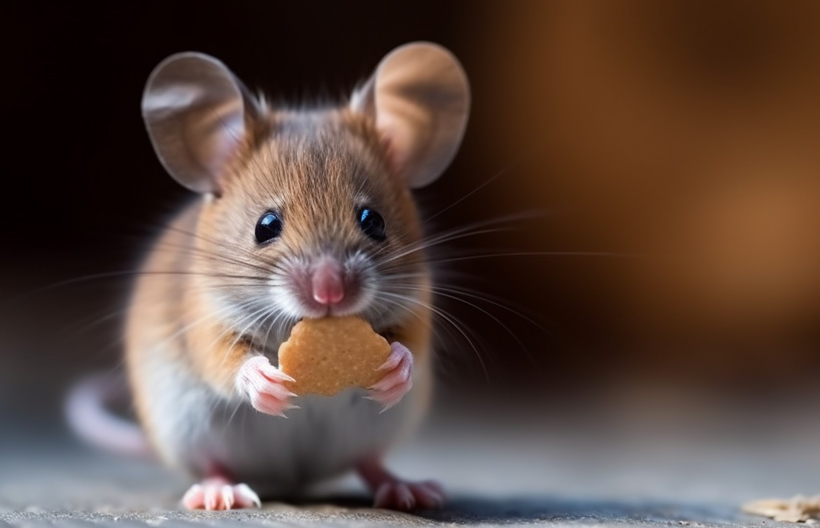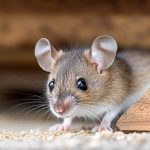How Long Can a Mouse Go Without Food?
Mice are small rodents known for their survival skills in various environments. Cutting off their food and water is crucial to eliminating them. While they are resilient, mice still require food to live. Restricting their daily intake helps control their population.
But raising the question: How long can a mouse go without food? Mice can survive for up to two weeks without food if they have water. But only 2–4 days without any sustenance. When deprived of food, their bodies will utilize fat reserves for energy, eventually resulting in death.
This article explores how long a mouse can survive without food, water, and in a trap. Let’s begin.
How Long Can A Mouse Go Without Food?
The average mouse can go without food for about 2-4 days. However, some mice have been known to go without food for up to 10 days.

Mouse survival without food depends on age, health, and water availability. Due to their relatively high metabolic rate, mice require frequent food intake to sustain their energy levels.
Factors Affecting A Mouse’s Ability To Go Without Food
There are a number of factors that can affect a mouse’s ability to go for a long time without food. These include:
- Age: Young mice have increased energy needs and may not handle fasting as well as older mice.
- Health and disease: Mice with pre-existing health conditions or diseases can compromise metabolic function and reduce fasting tolerance. Sick mice are less able to go without food than healthy mice.
- Water availability: While a mouse can survive for a short period of time without food, access to water is essential for survival. Water shortage can swiftly lead to dehydration and other health problems.
- Body fat storage: How long a rat can survive without food is affected by its body fat reserves. Mice fed more fat can endure longer, which is influenced by diet, exercise and metabolism.
- Sex: Female mice can generally go without food for longer than male mice.

Wild Mice vs. House Mice Survival without Food
- Mice in the wild have to work hard for their food and water.
- A mouse in the wild, running from one hiding spot to another to evade predators, will have high energy requirements. Hence, it’s hard for wild mice to survive longer without food than house mice.
- When mice inhabit homes, they face fewer natural predators, resulting in reduced calorie needs. Thus, house mice have lower energy requirements compared to wild mice because they don’t need to exert as much effort to survive in a protected environment.

How Long Can A Mouse Go Without Water?
Mice, like all living organisms, require water to survive. Water is essential for their biological processes, maintaining their body temperature, digestion, and overall health.

Mice can survive for a surprisingly long time without water. The little mice can go for months without drinking any water. But their water-consuming process has direct and indirect ways. For example,
1. Direct Water
Mice consume water from various direct sources such as streams, lakes and reservoirs. They can drink water collected on plants through rain and condensation.
Within your home, mice can find water in several places, including leftover water in sinks, condensation around pipes in walls, water in drains, or even sometimes overlooked sources like pet water dishes.
2. Indirect Water
Mice, like humans and other animals, can obtain water indirectly through the food they consume.
And surprisingly, mice can survive without directly drinking water for up to a month. They typically obtain hydration by extracting water from their food, even from foods that might seem dry to us. The water content in their diet is sufficient to sustain them without additional water intake.
How Long Can A Mouse Survive In A Trap?
A mouse’s survival period in a trap might vary based on the type of trap, environmental factors, and the health of the mouse.

Humane Trap
- Depending on its construction, a mouse can survive in a humane trap for several hours.
- If the trap includes additional air holes and space for the mouse to move, it may last around 6-8 hours.
- Using a trap with limited ventilation can lead to the mouse’s death within 2-3 hours.
Here is a video of how to make a humane mouse trap with plastic buckets-
Snap Trap
Snap traps are designed for an instant, humane killing of mice, ensuring a swift and painless death for effective rodent control.
- When a mouse is captured in a snap trap, it usually dies immediately.
- However, in some situations, the mouse may be able to survive for a short while.
- The length of time a mouse may live in a snap trap depends on several factors, including trap force, trap placement, and the mouse’s age and health.
- However, if the trap is not placed properly or if the mouse is very small, the mouse may survive for a few minutes or even hours.
Glue Trap
Glue traps capture mice alive, giving them a chance to attempt to escape the sticky surface. The glue trap is incredibly powerful, and mice have no way out.
They die of exhaustion, malnutrition, dehydration, and suffocation. The entire procedure could take 3 to 24 hours or more.
Mice are surprisingly resilient creatures. After learning about their remarkable ability to survive without food, you might be intrigued by their social behaviors. Dive deeper and find out if mice can recognize when one of their own is missing. Moreover, it’s essential to understand the natural food chain. Discover more about the creatures that have mice on their menu by reading about what eats mice.FAQs
This section answers some of the most common questions about how long a mouse can survive without food:
Q: Will mice go away if there is no food?
Yes, if there is no food available, mice are more likely to leave an area in search of alternative food sources. Like any living creature, mice need a reliable food supply to survive and thrive.
When their food source becomes scarce or unavailable, they will instinctively seek out new locations where they can find food.
Q: How long can a mouse live in your house?
Mice typically live in a house with ample shelter and food sources for about two years. Their survival mainly depends on access to food and water. With the primary threats being disease and interactions with humans or pets, mice need a steady supply of food and water to survive.
If there is plenty of food and water available, mice can live for a long time in your house. However, if the food supply becomes limited, mice may start to die off.
Q: Where do mice go when they die?
When mice die, they usually remain where they passed away, often in concealed spots. In the wild, they may die in nests or burrows. And become prey for predators such as birds of prey, snakes, and scavengers.
In human-made environments, like homes or buildings, mice might die in hidden areas like wall voids, under floorboards, or in attics. Even if the body is not seen, the decaying odor can give away its presence.
Final Words
Mice are small creatures with a high metabolism, so they need to eat regularly to survive. They can go for up to two to four days without food, but after that, they will start to starve.
If you have a mouse infestation in your home, getting rid of it as soon as possible is important. Mice can spread disease and damage property, so it is important to get rid of them before they become a problem.




